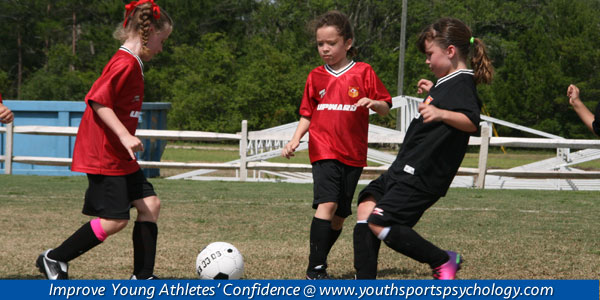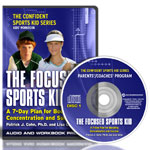
Pregame Routines For Sports Kids
What kids focus on while playing sports can make or break their confidence–and performance.
Simply put, kids often focus on the wrong “cues” or too many things at once.
Today we’re going to address a common challenge:
When kids are playing or performing, they often think they should focus on the details of what they learned during practice.
But that can bog them down when in competition. Often, they’ll get lost in all the details, such as the mechanics of a sound forehand stroke, set up, and recovery. This is too much to focus on at once.
You need to help kids trust what they learned in practice and play intuitively.
Pregame routines can help young athletes achieve these goals.
A pregame routine is a final mental tune-up before kids compete. It helps them loosen up, focus their minds, boost their confidence and trust their abilities.
Sports kids should follow four steps when using a pregame routine:
- Shoot down any last-minute doubts that might hurt their confidence. They need to tell themselves they’re not too small, too slow or too wimpy!
- Set one or two process goals that will help them focus on execution. In tennis, that might be taking the ball early or mixing up shots. In triathlon, that might be monitoring their heart rate or staying with the lead pack.
- Rehearse their performance by seeing or feeling themselves playing with total focus and feeling confident about their abilities.
- Concentrate on execution, not on the score or anything in the future. Kids should only think about the first two minutes of the start of the game and what they need to do to succeed in those two minutes.
As we’ve mentioned before, kids should be focusing on the here-and-now. They shouldn’t be analyzing what they learned yesterday, or thinking about what the game’s outcome will be.
And they definitely don’t want to remind themselves of past mistakes. They want to keep it simple. They need to be able to react quickly and instinctively.
That’s what trusting in their practice is all about and focusing on the right cues can help them do that.
Practice is a time to learn new skills. Competition is the time to focus on reacting and trusting what they have learned.
We’re getting the idea that you, as sports parents and coaches, understand the importance of focus. Your responses to our blog post address some of the issues that cause kids to lose confidence and perform badly as a result of focusing on the wrong things–their parents or their previous mistakes, for example.
Related Articles on Youth Sports:
- Help Your Athlete With Focus During Competitions and Practice!
- Help Young Athletes Avoid Freezing Up During Competitions
- Helping Young Athletes ‘Wing it’ During Games
*Subscribe to The Sports Psychology Podcast on iTunes
*Subscribe to The Sports Psychology Podcast on Spotify
Help Your Young Athletes Improve Focus In Sports!

Are your young athletes easily distracted by people shouting on the sidelines? Do they obsess over their mistakes? Do they worry about what people think of them?
These issues will cause their concentration and performance to suffer!The Focused Sports Kid helps kids overcome distractions that can hurt their performance in sports.
The Focused Sports Kid program is actually two programs: one for sports parents/coaches that provides mental game tips especially designed for parents and coaches, and for young athletes, ages 8 to 12, that will walk them through 7 simple lessons in mental focus in sports.

Our child is a competitive squash player who has made huge progress over the last couple of years. However, there is one opponent he has never beaten, and it has become a mental issue. We believe he has the necessary skills to win, but every time they meet, the other boy comes out on top. A big part of the problem is that our son doesn’t like this kid on a personal level, and typically, he doesn’t perform as well against people he dislikes. For example, if he thinks they are dishonest in their play, it really bugs him. He tightens up, makes unforced errors, and loses. He’s aware that this is a big roadblock for him, but doesn’t know how to “put the blinders on” on stay relaxed/focused. Help!
He’ll get better with maturity, but he has to treat the other person as a competitor rather than someone he dislikes. Also, making bad calls will only cause him to lose a couple points, but getting upset over the bad calls will cause him to lose several points.